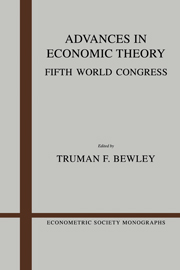Book contents
- Frontmatter
- 1 Auction theory
- 2 Game-theoretic analyses of trading processes
- 3 The theory of contracts
- 4 Battles for market share: incomplete information, aggressive strategic pricing, and competitive dynamics
- 5 A sequential strategic theory of bargaining
- 6 On the complexity of linear programming
- 7 Laboratory experimentation in economics
- 8 Increasing returns and the theory of international trade
- 9 Strategic aspects of trade policy
- 10 Equilibrium without an auctioneer
- 11 Arrow-Debreu programs as microfoundations of macroeconomics
10 - Equilibrium without an auctioneer
Published online by Cambridge University Press: 05 January 2013
- Frontmatter
- 1 Auction theory
- 2 Game-theoretic analyses of trading processes
- 3 The theory of contracts
- 4 Battles for market share: incomplete information, aggressive strategic pricing, and competitive dynamics
- 5 A sequential strategic theory of bargaining
- 6 On the complexity of linear programming
- 7 Laboratory experimentation in economics
- 8 Increasing returns and the theory of international trade
- 9 Strategic aspects of trade policy
- 10 Equilibrium without an auctioneer
- 11 Arrow-Debreu programs as microfoundations of macroeconomics
Summary
The development of the microfoundation of macroeconomics has been slow going; very interesting, but slow going. I want to begin with an elaboration of why this subject is hard (for me). I will then discuss two lines of research that explore what happens when economies are modeled without a Walrasian auctioneer - search theory (Section 1) and the theory of bank runs (Section 2). Of course, this is only a piece of the literature that identifies itself as the microfoundations of macroeconomics. I will concentrate on the flavor of results, rather than on the technical problems of constructing tractable macro-oriented models within the micro rules of model construction.
Microanalysis
The fundamental theorem of welfare economics makes possible straightforward use of the competitive general equilibrium model for the analysis of distortions in the economy. Because the economy would be Pareto optimal otherwise, it is easy to see the welfare implications of altering one of the assumptions of the Arrow-Debreu model. Observing pollution, one changes the assumption that production decisions do not affect individual utilities directly. One can then analyze the utility implications of pollution (compared with a different production technology or a different production decision), calculate socially optimal production decisions (for different criteria and different accompanying income redistribution tools), and design price and tax policies to improve or optimize resource allocation. A parallel literature analyzes congestion.
- Type
- Chapter
- Information
- Advances in Economic TheoryFifth World Congress, pp. 363 - 378Publisher: Cambridge University PressPrint publication year: 1987
- 3
- Cited by



